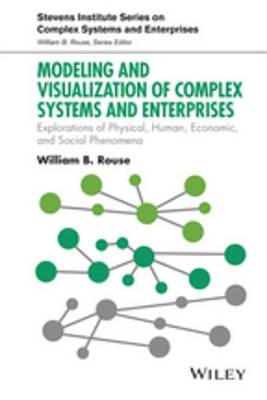Stevens Institute Series on Complex Systems and Enterprises
3 total works
Perspectives on Complex Global Challenges
by Elisabeth Pate-Cornell and William B. Rouse
Examines current and prospective challenges surrounding global challenges of education, energy, healthcare, security, and resilience
This book discusses issues in large-scale systems in the United States and around the world. The authors examine the challenges of education, energy, healthcare, national security, and urban resilience. The book covers challenges in education including America's use of educational funds, standardized testing, and the use of classroom technology. On the topic of energy, this book examines debates on climate, the current and future developments of the nuclear power industry, the benefits and cost decline of natural gases, and the promise of renewable energy. The authors also discuss national security, focusing on the issues of nuclear weapons, terrorism and cyber security. Urban resilience is addressed in the context of natural threats such as hurricanes and floods.
- Studies the usage of a globalized benchmark for both student and pedagogical performance
- Covers topics such as surveillance, operational capabilities, movement of resources, and the pros and cons of globalization
- Examines big data, evolving medical methodologies and effects on the medical educational curriculum, and the positive effects of electronic records in healthcare data
Perspectives on Complex Global Challenges: Education, Energy Healthcare, Security, and Resilience serves as a reference for government officials, personnel in security, business executives and system engineers.
Explores the nature of academic enterprises, including why they work the way they do and where such enterprises are headed, with the goal of gaining insights into where change can and will happen
This book looks at universities from a whole-enterprise perspective. It explores the steady escalation of the costs of higher education and uses a computational economic model of complex academic enterprises. This model includes component models of research, teaching, administration, and brand value. Understanding the relationships among practices, processes, structure, and ecosystem provides the basis for transforming academia, leveraging its strengths and overcoming its limitations. More specifically, this architecture helps the reader understand how various elements of the enterprise system either enable or hinder other elements of the system, all of which are embedded in a complex behavioral and social ecosystem. Each topic is explored in terms of the levels of the architecture at which it primarily functions. Levers of change within each area are discussed, using many experiences of pursuing such issues in a range of academic enterprises.
- Provides a new methodology by taking a more systems-oriented approach to education systems as a whole
- Shows how various elements of the enterprise system either enable or hinder other elements of the system
- Offers alternative strategies for transformation of academic enterprises
Universities as Complex Enterprises: How Academia Works, Why It Works These Ways, and Where the University Enterprise Is Headed is a reference for systems scientists and engineers, economists, social scientists, and decision makers.
William B. Rouse is the Alexander Crombie Humphreys Chair within the School of Systems & Enterprises and Director of the Center for Complex Systems and Enterprises at Stevens Institute of Technology, Hoboken, New Jersey. He is also Professor Emeritus, and former Chair, of the School of Industrial and Systems Engineering at the Georgia Institute of Technology, Atlanta, Georgia. Rouse has written hundreds of articles and book chapters, and has authored many books, including most recently Modeling and Visualization of Complex Systems and Enterprises (Wiley, 2015).
Modeling and Visualization of Complex Systems and Enterprises
by William B. Rouse
Explains multi-level models of enterprise systems and covers modeling methodology
This book addresses the essential phenomena underlying the overall behaviors of complex systems and enterprises. Understanding these phenomena can enable improving these systems. These phenomena range from physical, behavioral, and organizational, to economic and social, all of which involve significant human components. Specific phenomena of interest and how they are represented depend on the questions of interest and the relevant domains or contexts. Modeling and Visualization of Complex Systems and Enterprises examines visualization of phenomena and how understanding the relationships among phenomena can provide the basis for understanding where deeper exploration is warranted. The author also reviews mathematical and computational models, defined very broadly across disciplines, which can enable deeper understanding.
- Presents a 10 step methodology for addressing questions associated with the design or operation of complex systems and enterprises
- Examines six archetypal enterprise problems including two from healthcare, two from urban systems, and one each from financial systems and defense systems
- Provides an introduction to the nature of complex systems, historical perspectives on complexity and complex adaptive systems, and the evolution of systems practice
Modeling and Visualization of Complex Systems and Enterprises is written for graduate students studying systems science and engineering and professionals involved in systems science and engineering, those involved in complex systems such as healthcare delivery, urban systems, sustainable energy, financial systems, and national security.


